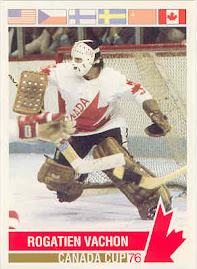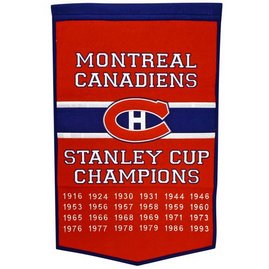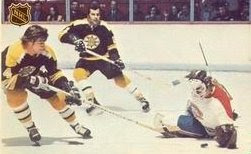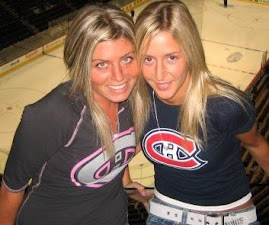
(Robert L Note: I hope that everyone is enjoying the chronological look back at the goaltenders in Montreal Canadiens history. It is a very busy time for me, due to a lot of reasons, so hopefully soon I can get back to posting a new addition each day. One of the things I have become proudest of most with this site is the reader interest and their willingness to make a contribution. Readers really seem to care about this space, which is way more than I could have ever envisioned when I so humbly began over a year ago. Testament to that, is the time spent by one reader to research the initial post in this series, "Habs Goalies Of 1909 - 1910". Chuck, from the Toronto area, went into great detail to breakdown what likely occured between the pipes during the Habs first season - one that had been very poorly documented due to several factors. With Chuck's research, logic, and clarity, the roles and sequence of events that season are now much more clear. Check out that first post again here, and see what Chuck has added to it. On a similar note, I would also like to add that if any readers should feel they have something larger to say or add to this series, or to this blog site in general, they can e-mail me with their notions. I'd welcome whatever it is you have to offer. Thanks again for your contributions and steady flow of encouraging and kind words - and Chuck, the first cold one is on me at the next Summit!)
In the later stages of the 1930's and the early years of the 1940's, the Canadiens started turning the corner on their darkest years. Bolstered by the genius of two great builders, T.P. Gorman and by 1940's end, Frank Selke Sr, the Canadiens were putting the seeds in place to build a feeder system of clubs, which would allow the Canadiens to sign and develop a great amount of talent within the next decade. After Toe Blake had been literally robbed from the Montreal Maroons, players such as Elmer Lach, Maurice Richard, and Emile Bouchard would come along, one piece at a time, laying the foundation for the Canadiens first Stanley Cup in 13 seasons.
The Canadiens next great goaltender in the Vezina and Hainsworth mould, was Bill Durnan, who would come to the club in 1943. Between Wilf Cude and Durnan, Bert Gardiner and Paul Bibeault raised the bar for Habs netminders by simply being just more than adequate. While both enjoyed interesting NHL careers, it soon became obvious that the Canadiens would need more prominance at the position to reach the Stanley Cup. For the time being though, Gardiner, and then Bibeault kept the Habs competitive.
Gorman's feeder system had yet to begin producing quality netminders for the Canadiens, but certain talents were toiling in the Habs ranks, which surely kept goaltenders looking over their shoulders more than before. Two such goalies were Lionel Bouvrette and Al Picard, who were asigned to the Quebec Aces and Buffalo Bisons respectively. While both were hot commodities for short periods of time, neither ever played for the Canadiens, with only Bouvrette seeing NHL action in game for another team while on loan, a common practice in Original Six years.
There were likely other goaltending prospects for the Canadiens in this time, but records from the day make determining such signings and association rather incomplete to qualify as fact.
Gardiner, Bibeault, Bouvrette, and Picard are all profiled here.
Bert Gardiner 1940 - 1942

Goaltender Bert Gardiner was born in Saskatoon in 1913 and played his minor hockey there before moving west where he led the Calgary Jimmys of the CCHL to two consecutive Memorial Cup appearances in 1932 and 1933.
Gardiner returned to Saskatoon for a season before signing a contract with the New York Rangers in October, 1935. He played one game between the pipes with the Rangers in 35-36 and another 6 in the 38-39 playoffs.
He remained the NHL property of the Rangers until being traded to the Montreal Canadiens in April, 1940.
In the 1940-41 season, Gardiner played in 42 games going 13-23-6. He played ten more games with the Habs the following season ( 1-8-1, 4.06 ) and then in 1942-43 was loaned to the Chicago Blackhawks. They took good advantage of the loan, using Gardiner for 50 games.
Montreal traded Gardiner to the Boston Bruins in 1943 along with cash for the right to repurchase him if they desired. He played 41 games with the Bruins, retiring at the end of the season.
After hockey he lived in the Chicago area for many years before heading to California in the 70s where he remained until his death on August 28, 2001. He is buried in the Green Hills Memorial Park in Rancho Palos Verdes, California.
Lionel Bouvrette - In The System 1941 - 1947

Goaltender Lionel Bouvrette is one of the many former players who fit in the category of "One-Game Wonders" in the NHL.
Bouvrette's rights were owned by the Montreal Canadiens, but they agreed to loan him to the Rangers on March 18, 1943, to fill in for the injured Jimmy Franks.
For Bouvrette, who grew up near Ottawa, Ontario, his NHL career was short and perhaps not so sweet. During the 1942-43 season, with many regular NHL stars off fighting in World War II, he suited up for one contest as a member of the New York Rangers and lost the game by a 6-0 score. Bill Beveridge, Steve Buzinski and Franks were the others who tended goal for New York that season.
Bouvrette himself missed some playing time due to the war effort, but eventually returned to the ice as a member of the Quebec Aces in the QSHL. In 31 games, Bouvrette had one shutout and posted a 3.71 GAA in 1944-45. He led the QSHL three times in shutouts, once as a member of the Montreal Concordia and twice with the Aces and in 1944 was the recipient of the Vimy Memorial Trophy, awarded to the MVP of the QSHL.
After playing just eight games in 1946-47, Bouvrette retired from professional hockey at the age of 32.
"I don't think I could live if it wasn't for sports. As long as you can stand on two feet, you can do it," said Lionel Bouvrette in 1994. Bouvrette had just taken home a bronze medal in a shuffleboard tournament in Delray Beach, Florida.That love for sports included a stint in professional hockey
In the 1942-43 season Bouvrette got the chance to play at the top level, the NHL, when the New York Rangers needed an emergency replacement. Bouvrette went between the pipes for the blueshirts and gave up six goals in his NHL debut. The next game Bouvrette was back with the Quebec Aces
The following season Bouvrette was able to celebrate an Allan Cup championship with the Aces. Bouvrette had two more strong seasons before his skills started to decline.Lionel Bouvrette never did get another chance to play in the NHL. Bouvrette passed peacefully away at the age of 85 years old in Delray Beach, Florida on February 8, 2000.
Al Picard - In The System 1943 - 1946
Al Picard was a goaltender in the Montreal Canadiens system who played for the Buffalo Bisons from 1943 to 1946, and for the Dallas Texans in 1945-46.
Early in the 1945-46 season, the Canadiens assigned Picard to the Dallas Texans (USHL), a short lived affiliation for the Habs. The 20 year old goalie was said to be highly rated by Texans coach Leroy Goldsworthy, who was well aquainted with Canadiens prospects from having previously worked in their organization.
Dallas had an option to sell of Picard's contract to an NHL team, according to one press release, should the team perform well and the Canadiens not resign him by season's end.
No sale of Picard materialized, as the Texans weren't successful on or off the ice. Picard appeared in 24 games, allowing close to four goal per game.The goaltender toiled in fringe league teams such as the Oakland Oaks (PCHL), the Houston Skippers / Huskies (USHL), the Vancouver Canucks (PCHL), and finally the lowly North Bay Black Hawks of the North American Hockey Association in 1951.
The Dallas Texans franchise lasted beyond the Habs ties, existing less than a decade in total. At one point they employed former Habs, Leafs, Bruins, and Black Hawks stopper Paul Bibeault.
Paul Bibeault 1941 - 1946

Goalie Paul Bibeault played over 200 games for four different clubs during the 1940s. He was a consistent and durable competitor whose solid work often came as an emergency fill in for established star who was called to military service. His other claim to fame was being the son-in-law of the legendary Frank Selke.
The Montreal native impressed the Canadiens' scouts while he starred with the Verdun Junior Maple Leafs and was signed as a free agent on March 6, 1941. He played four games for the Habs in 1940-41 then gained further seasoning with the senior Canadiens and the AHL's Washington Lions.
On March 15, 1941, Bibeault was involved in the oddest of shared shutout games when Montreal coach Dick Irvin rotated Bibeault and Bert Gardiner every seven minutes of their 6-0 victory over the New York Americans.
Bibeault played nearly two full years with Montreal and led the NHL with 50 appearances in 1942-43.

After serving briefly in the army, Bibeault was discharged and joined the Toronto Maple Leafs in December, on loan for the last half of the 1943-44 season. In so doing he became the third goalie after George Hainsworth and Lorne Chabot to play for both the Maple Leafs and the Canadiens. Bibeault excelled for the Maple Leafs with five shutouts and earned selection to the NHL second all-star team. In 1944, Bibeault became a Boston Bruins, on loan from the Habs again, after Boston lost star netminder Frank Brimsek to military service.
Bibeault was recalled from Boston to Montreal, acting as an injury replacement for Bill Durnan, January 6, 1946. In September of that year, Bibeault was dealt to Chicago Blackhawks for George Allen, with both teams holding recall rights. The Canadiens exercised that right on June 2, 1947, recalling Bibeault one last time.
After playing 41 games for the Chicago Black Hawks in 1946-47, Bibeault spent the remainder of his career in the minors. His finest season came in 1948-49 when he starred for the USHL's Dallas Texans. Bibeault was placed on the league's first all-star team, won the Charles Gardiner Memorial Trophy as the top goalie in the USHL, and was presented the Herman W. Paterson Cup as the league MVP. He retired in 1955 after playing a couple of games for the IHL's Cincinnati Mohawks.

What follows here is an excellent piece, courtesy of Dave Stubbs, and published in the Montreal Gazette in 2007 about the journeyman goaler who left us in 1970 at the age of 51, losing a battle to cancer.
It was Paul Bibeault who was in Toronto's net at the Forum on March 23, 1944 when Maurice (Rocket) Richard exploded for all five of the Canadiens goals in a 5-1 Game 2 semi-final playoff series victory, starting the puck rolling toward Montreal's fifth Stanley Cup win.

The story is one of many about Canadiens legend Maurice (Rocket) Richard, a playoff performer for the ages who would dial up his scary intensity a few notches for the postseason.
But too seldom does it include the name of the late Paul Bibeault, the little goaler who helped - not by choice - the Rocket write another chapter of National Hockey League history.
Bibeault’s name came to light again 10 days ago when Pointe-Claire announced plans to build a second 50-metre indoor pool. In 1965, Bibeault served as the first manager of the city’s new civic centre - an arena and Canada’s first Olympic-size indoor pool.
Two decades earlier, the Montreal native had played a key role in one of the Rocket’s most remarkable games.
The 1943-44 Canadiens arrived at their semi-final against the Toronto Maple Leafs with the best record in NHL history: 38 victories, just five losses and seven ties in the 50-game schedule.
It was the Rocket’s first season as No. 9, having switched from No. 15 to celebrate the weight of his first-born child. He finished his sophomore year with 32 goals in 46 games, becoming only the fourth Canadien to score 30 or more goals in a season.
Coach Dick Irvin had assembled the Punch Line: the left-shooting Rocket on right wing, Elmer Lach playmaking at centre, Toe Blake on the left.
So it was that the Canadiens, having finished 25 points ahead of regular season runner up Detroit, met No. 3 Toronto, 33 points inferior, in the semi-finals and were stunned 3-1 in the March 21 Forum opener.
Toronto’s Bibeault was brilliant, making 60 saves in a glorious homecoming for a goaler who could change addresses more quickly than his socks.
From 1940-47, through his 214 NHL games, he played for the Canadiens twice, the Maple Leafs, Boston Bruins and Chicago Black Hawks, loaned to Toronto and Boston as a replacement for war-bound Turk Broda and Frank Brimsek.
A huge hit with the Canadiens francophone fans, Bibeault played 92 games for Montreal from 1940-43, including all 50 in 1942-43. He lost his job the following year to Bill Durnan, a future Hall of Famer.
And so Bibeault wound up in Toronto, playing while serving in the Canadian army reserve, to draw the assignment of facing Richard’s mighty Canadiens in the first round of the playoffs.
Leafs defensive winger Bob Davidson, the Bob Gainey of his day, threw a checking blanket over the Rocket in Game 1, and Bibeault was magnificent.
Richard and the goaler had been friends since childhood, and even the fiery Rocket had praise for the man who had made five dozen saves.
"You were too hot for us, Paul," he told Bibeault between games, quoted in the book Maurice Richard: Reluctant Hero. "But I’ll give you something to think about in the next one."
He didn’t, at first, held off the scoresheet in the first period of Game 2 on March 23. But then the Rocket slammed home three goals in the second, his first two 17 seconds apart, and two more in the third. Blake earned five assists; Lach had four.
Richard 5, Leafs 1.
Wrote the Toronto Star’s Andy Lytle: "There was a flashing brilliance to each of Richard’s goals because he moved in fast and struck with deadly effect as he fled across the goal mouth, his check hopelessly beaten and Bibeault at his mercy when he fired because all of the shots were oblique and pasted into the nets a split second before Bibeault could move."
Montreal Herald sports editor Elmer Ferguson was lustily booed when he selected the Rocket his third star. But then he announced Richard as his second star. And his first.
Montreal steamrolled the Leafs in five games, outscoring them 23-6. Bibeault went the whole way, finally swamped in an 11-0 series clinching loss.
Montreal then swept Chicago 4-0 to win their fifth Stanley Cup, their first in 13 seasons.
Bibeault was shipped to Boston, playing 42 games for the Bruins from 1944-46, and returned to the Canadiens for 10 starts in 1946, subbing for an injured Durnan. His NHL career ended with 41 games in Chicago in ’46-47 and a frantic drive to his spring wedding, which earned him a speeding ticket.
He’d met his bride, a switchboard operator at Maple Leaf Gardens, while playing in Toronto. She was Evelyn Selke, daughter of Leafs and future Canadiens manager Frank Selke Sr.
In his 2003 book Players, author Andrew Podnieks charts Bibeault, then just 28, next finding work in the American and United States minor-pro leagues, settling in the fall of 1949 as the International circuit’s Cincinnati Mohawks backup goaler and box-office manager.

Bibeault is the goalie on the right.
He ran the Rochester War Memorial Arena in the late 1950s, was named the first manager of the new Pointe Claire Civic Centre in 1965, and was appointed a ticket manager for Montreal’s Expo 67 world’s fair.
Bibeault was 51 in 1970 when he succumbed to cancer on the Selke family’s Rigaud farm.
Thirty-seven years later, he remains in the NHL record book as one of five goaltending victims of a player’s five goals in a single playoff game.
On Dec. 28, 1944, nine months after his postseason rampage, Maurice Richard moved his family - and its piano - up a winding staircase into the second floor of a Montreal duplex. Against the Detroit Red Wings at the Forum that night, the Rocket scored five times and assisted on three more. Wings goaler Harry Lumley, all of 19, was merely a spectator in Detroit’s net.
Better Harry than me, Paul Bibeault thought. That evening in Boston, the goalie’s Bruins were beating Chicago 2-1.
1941 Gazette caricature courtesy the collection of Howard McIntyre.































































































































































No comments:
Post a Comment